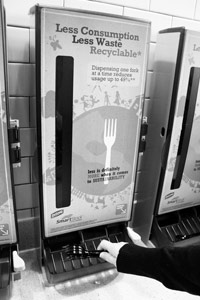Oasis wraps up utensil controversy
 CREDIT: ERIKA FAUST
CREDIT: ERIKA FAUSTThe Oasis restaurant on campus brought in new utensil dispensers in early October.
When Derek Meerburg, who is in his second year of Fanshawe's Paramedic program, picked up his first Western skillet of the school year at the Oasis, he was "absolutely disgusted" by what he saw: unwrapped forks, knives and spoons in bins outside the restaurant, waiting to be grabbed by diners.
Though he, like many other students, was unhappy with the situation, he waited for it to resolve itself. When nothing had changed by the end of September, he wrote a letter to Interrobang, which was published under the title "Student calls for packaged utensils" in the October 1 issue.
"I am not a germaphobe, but I am educated," Meerburg wrote. "When people sneeze or cough, tiny droplets spread through the air and can settle on hands and, eventually, on surfaces. Once these surfaces are contaminated, they act as a reservoir for organisms to live and multiply � By having all of the utensils exposed to the hands of any of the hundreds, a major health concern has been created. The plastic pieces that enter our mouths have the potential, and the likelihood, to act as a one-way ticket for organisms to enter our bodies."
Just one week after his letter was published, Meerburg and other students noticed a change in the Oasis: rather than the bins of unwrapped utensils, there were now large dispensers. Diners press a tab on the front of the machine to receive one fork, knife or spoon at a time.
"It's a perfect solution, in my opinion," Meerburg exclaimed in an interview with Interrobang. "It's exactly what we need."
According to Ryan McTavish, catering and Oasis operations manager, the utensils were never meant to be unwrapped.
"The intent was to have (the dispensers) the whole time," he said. "We were always going to go with something like this. It wasn't a decision to say, 'Okay, let's go more hygienic this year.' We had the idea the whole time, the supplier just couldn't supply the product in time."
McTavish said that with schools getting fired up for the new school year in September, they were all buying the same cafeteria products at the same time, which resulted in a shortage. The supplier had the utensil dispensers on back order, though they were meant to come in before the 2012/13 school year even began.
By October, McTavish had been waiting a full month for the dispensers to arrive, so when Meerburg's letter was published in the newspaper, he used it to his advantage. "I got that letter and gave it to the supplier and said, 'Okay, go faster now!' So then he got them right away." McTavish said he believes the letter had some impact on the situation and likely helped to speed up the process.
new dispensers have the advantage of not only reducing waste - up to 49 per cent fewer utensils are wasted than with the bins - they also provide recyclable utensils as well, further lessening the environmental impact of a lunch at Oasis.
Keeping the dispensers stocked does cost more than buying bulk utensils, McTavish said, but "the cost wasn't in the decision for us ... We were going to do it anyway, for the benefit of the students."
Students who think this means that food will get more expensive need not worry. "The food cost is totally separate from operational items," explained McTavish. "We have a budget that's not incorporated with food. Because we have this, (the cost of) your hamburger's not going up. We have it separated in the budget."
And for students who worry about seeing the return of those unwrapped forks, McTavish assured that there are plenty of utensils in stock, and the Oasis won't be turning back to unwrapped.
McTavish said he is always open to ideas from students on how to improve the Oasis. You can get in touch with him at rmctavish@fanshawec.ca.













